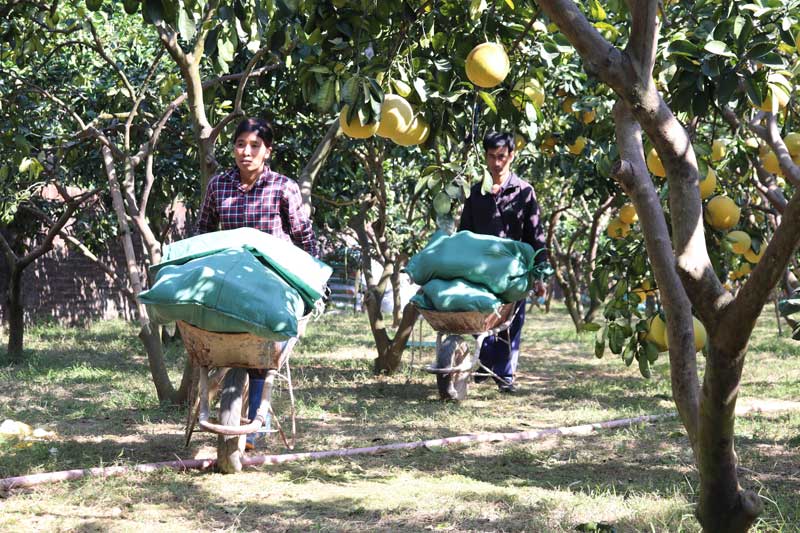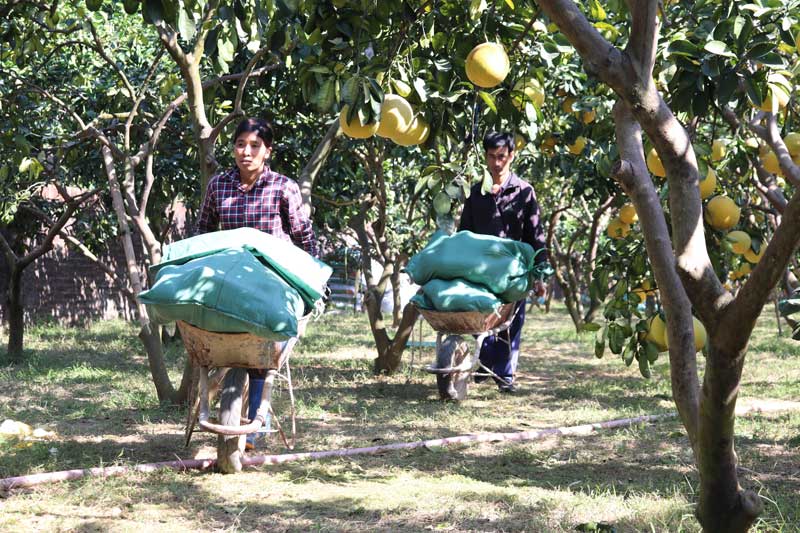
(HBO) – "Dien” pomelo grown in Yen Thuy district, Hoa Binh has been widely distributed across northern localities, such as Hanoi, Hai Phong, Quang Ninh and Ninh Binh, and well-received by customers there thanks to its good look and distinctive sweetness.
 Yen Thuy pomelo brings higher incomes for farmers
in the district’s Hang Tram township.
Yen Thuy pomelo brings higher incomes for farmers
in the district’s Hang Tram township.
Yen Thuy district
has expanded the farming areas of the well-known pomelo variety to increase
income for local farmers and protect the environment. So far the total area of
the pomelo in the district has increased to 600 hectares, including 265
hectares of maturing trees, 125 hectares grown under VietGAP standards, with an
output of over 6,000 tonnes of pomelo per year.
The largest areas
are seen in the communes of Ngoc Luong and Bao Hieu and Hang Tram township.
Over the recent
years, Dien pomelo is among citrus fruits that have played a significant role
in restructuring the agriculture sector in Yen Thuy.
A number of
cooperatives have been established in the district to create linkages among
local growers and scale up the application of VietGAP standards. If the pomelos
are cultivated, harvested and preserved properly, they can stay fresh for up to
3 – 4 months.
The fruit has
been promoted as a local specialty and named in the district’s "One Commune,
One Product” (OCOP) list. During the past two years, the district’s People’s
Committee cooperated with the Centre for Agrarian Systems Research and
Development (CASRAD) to carry out a project for the development and management
of "Yen Thuy” trademark.
The Intellectual
Property Office of Vietnam under the Ministry of Science and Technology has
issued trademark certification for "Yen Thuy pomelo” at Decision
No.76495/QD-SHTT dated on September 9, 2019.
The district
plans to focus on expanding areas of VietGAP-standard fruits and organic farm
produce to improve quality and prices of its agricultural products.
Pomelo farming is
expected to open more business opportunities for local farmers and help them
generate more income./.
According to data from the Hoa Binh Provincial Party Committee, the industrial production index for the first six months of 2025 is estimated to have increased by 20% compared to the same period last year. This marks the highest year-on-year growth rate for this period since 2020.
In the first six months of 2025, Hoa Binh province’s export turnover was estimated at 1.145 billion USD, marking an 18.11% increase compared to the same period in 2024. Import turnover was estimated at $ 804 million, a 17.15% increase, which helped the province maintain a positive trade balance.
The lives of the ethnic minority farmers in Tan Lac district have gradually improved thanks to the new directions in agricultural production. This is a testament to the collective strength fostered through the professional associations and groups implemented by various levels of the district’s Farmers’ Union.
With the motto the "product quality comes first,” after nearly one year of establishment and operation, Muong village’s Clean Food Agricultural and Commercial Cooperative, located in Cau Hamlet, Hung Son Commune (Kim Boi district), has launched reputable, high-quality agricultural products to the market that are well-received by consumers. The products such as Muong village’s pork sausage, salt-cured chicken, and salt-cured pork hocks have gradually carved out a place in the market and they are on the path to obtaining the OCOP certification.
In the past, the phrase "bumper harvest, rock-bottom prices" was a familiar refrain for Vietnamese farmers engaged in fragmented, small-scale agriculture. But today, a new spirit is emerging across rural areas of Hoa Binh province - one of collaboration, organisation, and collective economic models that provide a stable foundation for production.
Maintaining growing area codes and packing facility codes in accordance with regulations is a mandatory requirement for agricultural products to be eligible for export. Recently, the Department of Agriculture and Environment of Hoa Binh province has intensified technical supervision of designated farming areas and packing facilities to safeguard the "green passport" that enables its products to access international markets.



 Yen Thuy pomelo brings higher incomes for farmers
in the district’s Hang Tram township.
Yen Thuy pomelo brings higher incomes for farmers
in the district’s Hang Tram township.